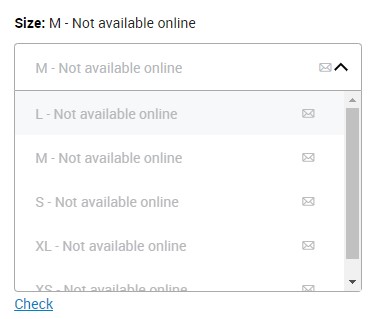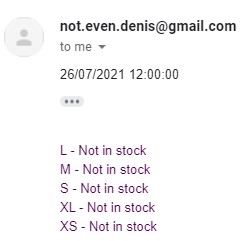This is an example of an automated availability checker running on Heroku.
The item in question is out of stock and the retailer's website does not allow to subscribe to availablity updates.
What should the script do:
- Go to website every 15 minutes and check if any frame size is available
- If it is, send me an e-mail
- If not, send emails at certain hours of the day (just so I know the script is still running)
It's also important to run it from the cloud, so I'll be using Heroku for that.
The piece of HTML code that contains relevant information looks like this:
<select
class="form-control form-control-select js-select-size js-select2"
id="group_5"
data-product-attribute="5"
name="group[5]">
<option value="" disabled>Pasirinkite dydį </option>
<option value="5698" title="L" data-stock="disabled"> L </option>
<option value="5697" title="M" data-stock="disabled"> M </option>
<option value="5696" title="S" data-stock="disabled"> S </option>
<option value="5699" title="XL" data-stock="disabled"> XL </option>
<option value="5705" title="XS" data-stock="disabled"> XS </option>
</select>
I am using requests to connect to the web page and BeautifulSoup to parse HTML code. I am looking for <select> tag with id="group_5" and get a list of option tags from it, extracting values of title and data-stock.
headers = {'User-Agent': 'Mozilla/5.0 (X11; Linux x86_64) AppleWebKit/537.36 (KHTML, like Gecko) Chrome/42.0.2311.90 Safari/537.36'}
def availability_check():
page = requests.get(link, headers=headers)
avail_dict = {}
is_avail = False
if page.status_code != 200:
error_message = 'Something went wrong: page code ' + str(page.status_code)
send_message('Bike Bot Error:', error_message)
try:
soup = BeautifulSoup(page.content, "html.parser")
lst = list(soup.find("select", id="group_5").find_all('option'))
for i in lst:
if i.get('value') != "":
size = i.get("title")
avail = 'Not in stock' if i.get("data-stock") == 'disabled' else 'AVAILABLE!'
avail_dict[size] = avail
if "AVAILABLE!" in avail_dict.values():
is_avail = True
except:
error_message = "Something went wrong at get_info stage"
send_message('Bike Bot Error:', error_message)
return is_avail, avail_dict
This function returns two objects - avail_dict - which is a dictionary with key-value pairs {Size: Availability}, and a boolean is_avail, indicating if any size is available. If an exception is raised, send_message() function is triggered. This function takes subject and text inputs and sends me an e-mail:
def send_message(subject, text):
USERNAME = os.environ['USERNAME']
PASSWORD = os.environ['PASSWORD']
RECIPIENT = os.environ['RECIPIENT']
# creates SMTP session
s = smtplib.SMTP('smtp.gmail.com', 587)
# start TLS for security
s.starttls()
# Authentication
s.login(USERNAME, PASSWORD)
# message to be sent
message_info = "\r\n".join(["from: " + USERNAME,
"subject: " + subject,
"to: " + RECIPIENT,
"mime-version: 1.0",
"content-type: text/html"])
content = message_info + "\r\n\r\n" + text
s.sendmail(USERNAME, RECIPIENT, content)
s.quit()
(Username, Password, and Recipient data is stored at Heroku's Config Vars)
Next I defined two functions - one for regular checks every 15 minutes, and another for sending an e-mail regardless of availability at set hours:
def regular_check():
is_avail, avail_dict = availability_check()
print('Regular check is running')
sys.stdout.flush()
if is_avail:
s, t = create_message(is_avail, avail_dict)
send_message(s, t)
def scheduled_report():
is_avail, avail_dict = availability_check()
s, t = create_message(is_avail, avail_dict)
send_message(s, t)
Both are using send_message() function, and there is another piece of the puzzle - create_message() function that takes avail_dict and is_avail variables (returned by availability_check()) and generates subject and text inputs for send_message():
def create_message(is_avail, avail_dict):
subject = "Bike Check: "
if is_avail:
subject += 'AVAILABLE!!!'
else:
subject += 'Not in Stock.'
now = datetime.now(tz)
text = str(now.strftime("%d/%m/%Y %H:%M:%S<br>"))
for k, v in avail_dict.items():
line = str(k + ' - ' + v + '<br>')
text += line
return subject, text
Finally, the two functions regular_check() and scheduled_report are added as jobs for APScheduler to run at defined intervals:
from apscheduler.schedulers.blocking import BlockingScheduler
from main import regular_check, scheduled_report
scheduler = BlockingScheduler()
regular_check = scheduler.add_job(regular_check, 'interval', minutes=15)
scheduled_report = scheduler.add_job(scheduled_report, 'cron', hour="12,15,18,22", timezone='Europe/Vilnius')
scheduler.start()
Procfile instructs Heroku to run scheduler.py script, that in turn uses regular_check() and scheduled_report() functions from main.py.
And here is an example of an e-mail being sent:

